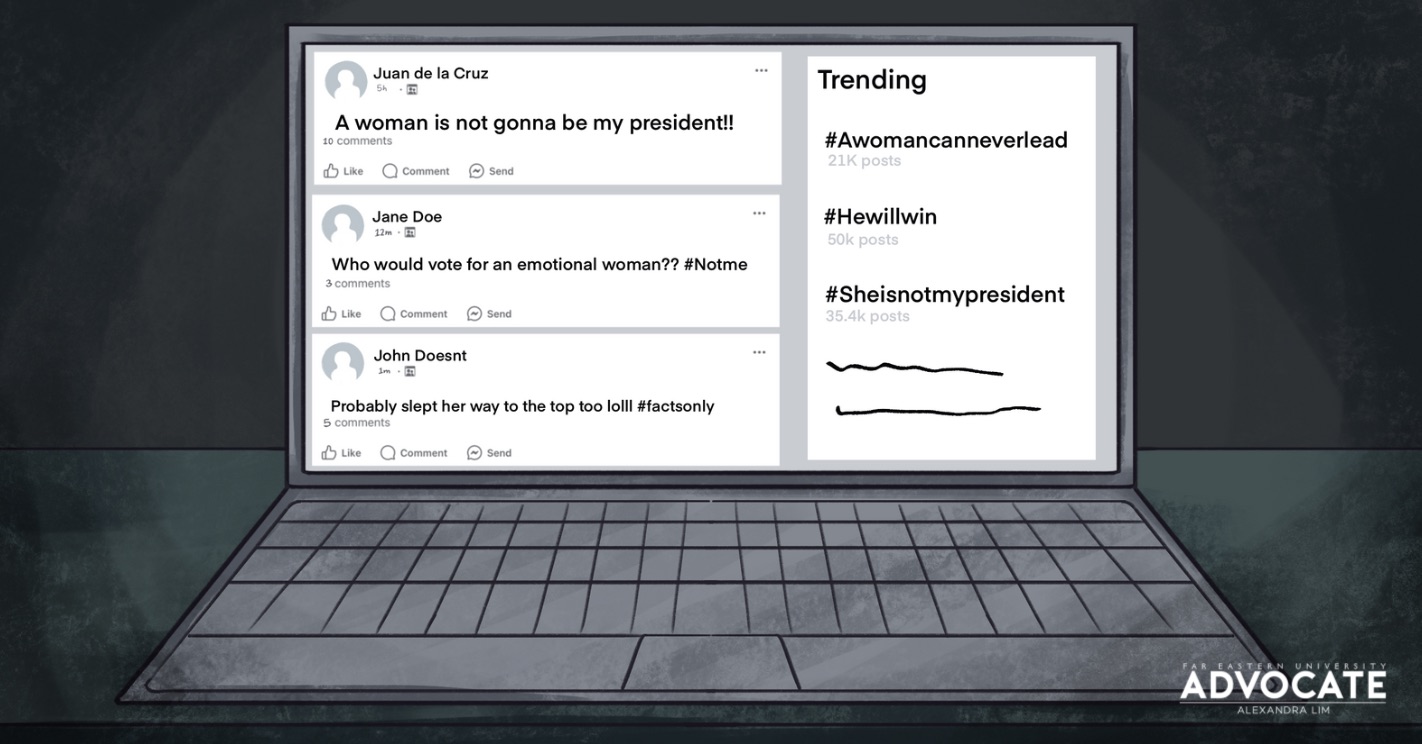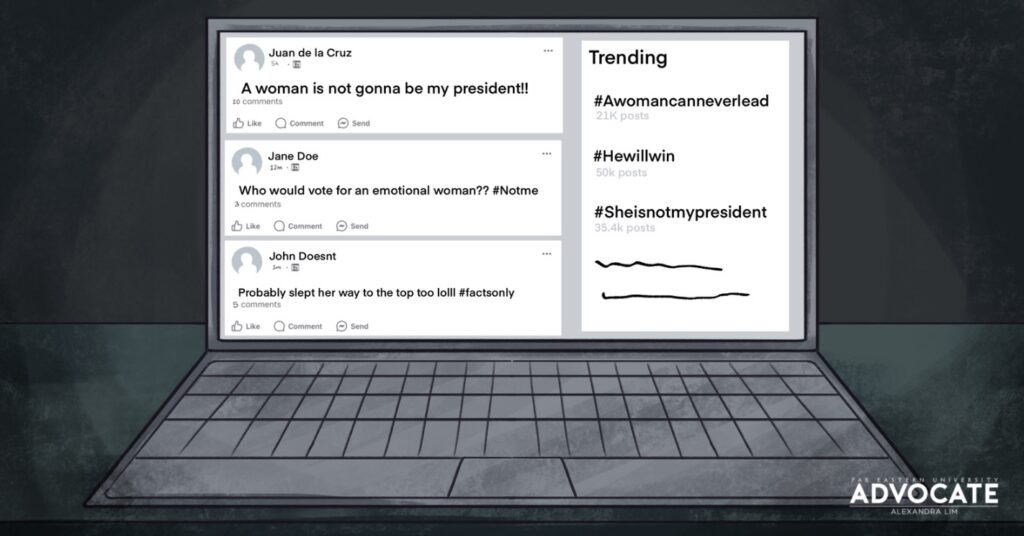
When competence isn’t enough
- November 14, 2024 16:54
FEU Advocate
November 14, 2024 16:54

Poppy
By Riva Aleina Mendoza, Junior Copyreader
The United States (US) and Philippine (PH) political landscape seem to have a striking similarity: electing ‘strongmen’ over more qualified female candidates. This trend has serious implications, not just for equality, but national progress as well.
In recent years, more women have been making their way into higher politics, challenging stereotypical male-centric leadership. Two notable figures are former PH Vice President Maria Leonor “Leni” Robredo and incumbent US Vice President Kamala Harris, both of which have emerged in the world of politics despite facing constant—often rooted from sexism—attacks on their capabilities as leaders.
Kamala Harris was elected as US vice president in 2020, alongside democratic president-elect Joe Biden, making her the first female vice president in American history.
Harris started her career in 1990 as a deputy district attorney in Alameda County. After 13 years, she was elected as the San Francisco district attorney, and, in 2010, became the first African-American and woman to be California’s attorney general. Before her win as vice president, she also secured a seat in the senate in 2016, becoming the second black woman and first South Asian-American to do so.
Similarly, former vice president Leni Robredo had been an active public servant prior to her election. Starting her career as a lawyer and being the representative of Camarines Sur’s 6th district before being appointed as the vice president.
Both female presidential aspirants were able to experience the different branches of the government: executive, legislative, and judiciary. With such a track record, you would think that Americans and Filipinos would know who to elect. Unfortunately, history has shown otherwise.
In the recent US elections, former and the 45th US president Donald Trump has been elected for his second term, winning against Harris, 312-226. On the other hand, Robredo lost to Ferdinand Marcos Jr. in the 2022 Philippine presidential elections, with 31 million Filipinos favoring the latter, securing 58.77 percent of the total votes.
Of course, we all have our preferences and opinions. However, I find it disturbing that people still elect personalities such as Trump, who is struggling with legal troubles including 34 felony counts, and Marcos, despite being a son of a dictator and a graft convict, and being convicted for tax evasion in 1995.
Now, a question lingers in my mind: how did Harris and Robredo, the more qualified out of the candidates, not come out victorious in their respective elections? How come two men, whose track records are marred with controversy, managed to secure the presidency?
While factors such as widespread disinformation, media scrutiny, and campaign challenges have undeniably contributed to the loss of Harris and Robredo, we cannot deny the underlying force that misogyny played in this disaster.
Misogyny in politics goes way back to history, when women were restricted their right to vote, which was only ended with the passing of the 19th Amendment in 1960 in America and the Women's Suffrage Bill in 1937 in the Philippines, to the way female politicians are harshly treated today—discouraging participation and creating barriers for those who already do.
While female representation in Congress has significantly been more prominent for the past few years, they face a hundred more setbacks to get there—numerous more attacks towards their womanhood.
Harris has been subjected to baseless criticisms such that she ‘slept her way to the top,’ and for being ‘too tough’ and ‘too assertive’—characteristics often praised in male politicians.
Opposite to Harris, Robredo has been criticized for her gentleness, compassion, and empathy—qualities we rarely witness in the world of politics.
These criticisms against female politicians alike have double standards painted all over them. How come a woman who holds her head up high is deemed bossy and unlikeable, while a man is loved for the same thing? What is it that when a woman achieves success, people immediately assume that she used her sexuality to her advantage, while the same accomplishments by a man are rarely scrutinized?
Such discrimination against women has underlying, often overlooked consequences, and it is disturbing to see that people fail to acknowledge nor care about these.
When women who are overly qualified and dedicated to serving the public are overlooked, national progress takes 10 steps back. It manifests into the policies and compromises the protection of reproductive rights, limits advancements of gender equality, and creates a system wherein qualifications are outweighed by outdated biases.
Aside from gender-focused policies, it imposes a threat to economic, healthcare, education, and foreign policies.
Take the election of Trump over Harris for example. One of Harris’ advocacies was to protect immigrants and create a tough but safe, more humane border management. On the other hand, Trump has been vocal about conducting workplace raids and mass deportation of undocumented immigrants and restoring the Remain in Mexico policy—which now constitutes a threat to not only to the Americans, but globally as well.
Mass deportation of immigrants in the US would not only be costly, but is also likely to impose economic instability and inflict trauma on affected families. Moreover, with approximately 250,000 to 300,000 undocumented Filipinos living in the US, forceful deportation will affect their livelihood and cause irreparable damage to their well-being.
Furthermore, Trump has also mentioned that the Philippines is a ‘perfect spot’ for military bases, emphasizing the strategic importance of the region. While strengthening the US-PH alliance in forms of militarization is important for national security, the president’s open hostility against China can add fuel to the already tense dynamics between China and the Philippines, triggering possibilities of a military conflict.
Similarly, Harris, in her visit to the Philippines in 2022, also expressed intent to expand the US’ military presence in the Philippines while being vocal about defending the country’s sovereignty. However, an analyst says that Harris would likely offer a “more humane, compassionate” approach to Biden’s policies, possibly preventing further conflict.
If we truly want progress, we must take a stand and dismantle the biases that continue to undermine the capabilities of leaders such as Harris and Robredo. Embracing leadership in all forms—free from all constraints—can unlock the full power of our collective efforts and chart a path toward a more just, inclusive world.
As long as we deny ourselves of what female leaders can offer, we can never achieve true national and societal advancement. Leadership is about competence and the ability to unify people—qualities that are not, and should never be, confined by gender.
(Illustration by Alexandra Lim/FEU Advocate)








